Share
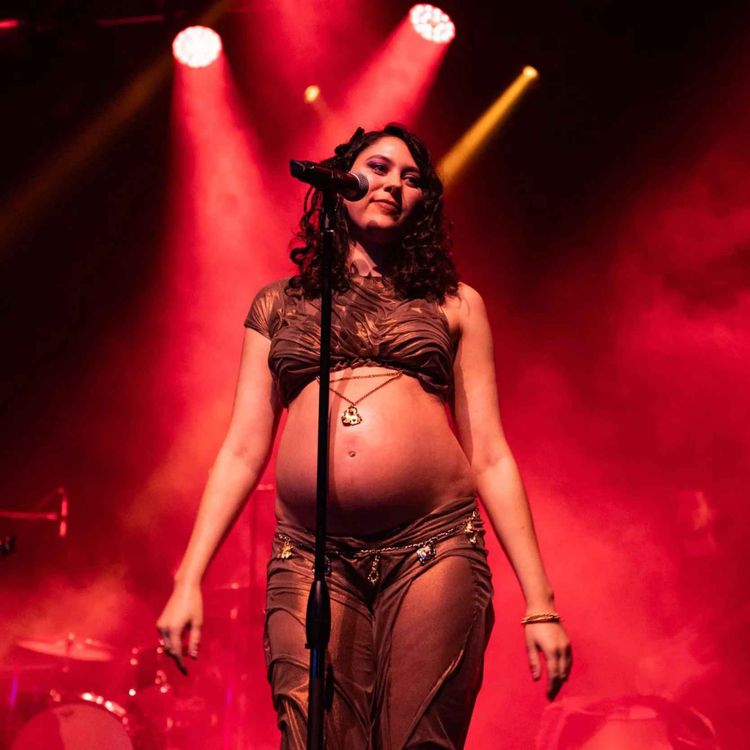
Steve Pretty On The Origin of the Pieces
Eliza, a cello made of U boats and Igbo flow
In another varied episode, Steve talks to soul singer Eliza about revealing her pregnancy live on stage, cellist Verity Simmons demonstrates her beautiful cello (and explains how it's partly made from a German U boat), and then Steve breaks down the fascinating genre of Igbo Rap in the Genre Tombola, including an in-depth transcription of some of the brilliantly complex rhythms.
Sign up for the Patreon, mailing list and everything else here: http://www.originofthepieces.com
Eliza's website: https://www.elizalovechild.com/
Eliza's instagram, including the pregnancy reveal: https://www.instagram.com/elizalovechild/
Verity Simmons: https://maslink.co.uk/client-directory?client=SIMMV1&
Three in a Bar podcast: https://www.threeinabar.com/
Razz Mataz (Episode 8) by Chucky P, Khenyzee, Space, Chumzy (Igbo Rap track): https://www.youtube.com/watch?v=LXWhvYDftMo
Additional Igbo Rap tracks to check out:
https://youtu.be/LXWhvYDftMo?si=7LpEr-v4TKa5oZjR
https://youtu.be/AckJs1noxMw?si=E9o41r7dSpxEjfO8
https://youtube.com/playlist?list=PLup2K0PBFlK1tY45LtqRKnfvOfY6scdqp&si=g705zAhYFbrZX4fw
More episodes
View all episodes
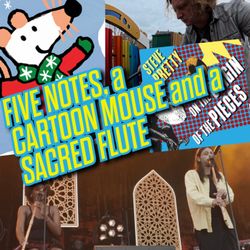
36. Five Notes, Maisy Mouse and a Sacred Flute
40:03||Ep. 36From a Colombian ritual flute heard backstage at Oslo Mela to a children’s TV theme tune played on a London school playground, this episode explores why pentatonic scales turn up everywhere — and why they feel so immediately playable, memorable, and emotionally direct. Along the way, Steve unpacks the thinking behind the theme tune he wrote for My Friend Maisy (also available on NOW), based on the books by Lucy Cousins, and how five carefully chosen notes can shape an entire musical world.The episode takes a gentle detour into Colombian traditional music with a backstage conversation recorded in 2024 with El León Pardo of Mestizo Collective, exploring the gaita — a ritual wind instrument built around paired male and female voices, deep cultural symbolism, and tightly limited pitch material. That sound becomes a useful reference point for the episode’s main thread: how scales function less like theory and more like palettes of identity.Back in TV land, Steve breaks down the Maisy theme in detail, showing how pentatonic scales sit at the heart of children’s musical toys, playground instruments, and early musical experiences — and why avoiding semitone clashes makes music feel instantly safe, inclusive, and playable. Using live demonstrations, playground recordings, and some creative repitching in Melodyne, the episode shows how tiny changes to a scale can completely transform a melody’s emotional character.In this episode:• A backstage conversation with León Pardo about the Colombian gaita, its ritual use, construction, and sound-world.• How male and female gaita flutes are paired, and what that reveals about musical identity.• Why pentatonic scales appear in folk traditions, playground instruments, and children’s musical toys worldwide.• A breakdown of the theme tune Steve wrote for My Friend Maisy, based on the books by Lucy Cousins.• Why playground bells and boomwhackers are almost always pentatonic — and why that matters.• A live experiment repitching the Maisy theme into an Ethiopian-inflected pentatonic.• Why thinking of scales as identities or colour palettes can make musical listening feel less intimidating.Also in this episode, Steve reflects on why many people drift away from music when theory becomes detached from sound — and why listening itself is a learnable, creative skill, whether or not you play an instrument.Plus details of the upcoming Steve Pretty On the Origin of the Pieces live shows at Wilton’s Music Hall on 24th January, including the first ever Origin KIDS matinee at 2pm and the evening show at 7pm. Full details and tickets at originofthepieces.com/live.🎧 Listen, rate and share to help more musically curious ears find the show.💻 More episodes, transcripts, and extras atoriginofthepieces.com🪶 Patreon:patreon.com/StevePrettyOnTheOriginofthePiecesStay musically curious.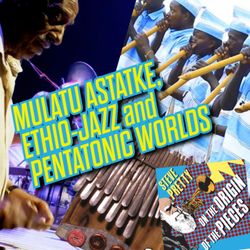
35. Mulatu Astatke, Ethio-jazz and Pentatonic Worlds
48:39||Ep. 35From Addis to the Barbican and back again, this episode dives into the sound-world shaped by Mulatu Astatke — the father of Ethio jazz. With Mulatu having recently completed his farewell tour, Steve goes back to a long, previously-unreleased interview he recorded with him during the making of Hackney Colliery Band’s Collaborations: Volume One. What emerges is a portrait of a true pioneer: a composer trained in London and at Berklee, a collaborator with Duke Ellington, and the architect of a style heard across film soundtracks, samples and stages worldwide.Expect discussions of Ethio jazz’s roots in traditional modes and tribal instruments; a journey through pentatonic and diminished scales; and Mulatu’s deep reflections on African musical heritage and collaboration. There’s even a live extract of Derashe from HCB’s Barbican show — the tune he discusses in the interview.In this episode:• How Mulatu fused Ethiopian pentatonic traditions with jazz harmony and improvisation.• Why some Ethiopian tribes use diminished (whole–half) scales, and how that changes the emotional palette.• The story of Duke Ellington’s Jazz Ambassadors tour — and how Ellington ended up performing one of Mulatu’s arrangements in Addis.• The embilta, washint and other Ethiopian wind instruments that parallel trumpets, trombones and baritone sax.• The link between African “bush” instruments, mbira/“African piano” traditions, and Western harmonic thinking.• A rare 2018 interview captured at Livingston Studios during the HCB/Mulatu recording sessions.• A live performance of Derashe from the Barbican, featuring Hackney Colliery Band and Mulatu Astatke.Also in this episode, Steve welcomes listeners from the New Scientist Podcast and explores the science–music crossover behind shell acoustics, underwater sound, and the physics of musical evolution. Plus a reminder that the new Origin of the Pieces website now includes full transcripts, an interactive world-map archive of every episode, and a growing library of extras.And don’t miss the upcoming Wilton’s Music Hall shows on 24th January 2026, including the first ever Origin KIDS matinee at 2pm and the evening performance at 7pm. TICKETS.🎧 Listen, rate and share to help more musically curious ears find the show.💻 More episodes and extras at originofthepieces.com🪶 Patreon: https://patreon.com/StevePrettyOnTheOriginofthePieces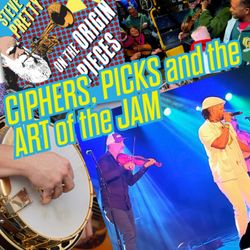
34. Ciphers, Picks and the Art of the Jam
53:52||Ep. 34From the high lonesome sound of Appalachia to the flow of a Bronx cipher, this episode explores what happens when two traditions of storytelling and rhythm collide. Recorded at the WOMEX 2024 world-music gathering in Finland, Steve talks with Gangstagrass — the trailblazing American group fusing bluegrass instrumentation with hip-hop lyricism and beats.Expect fiddles, banjo and beats; live sessions that blur the line between folk jam and freestyle; and a conversation about community, curiosity and the shared language of groove. There’s even a spontaneous rap about Origin of the Pieces and a bus-ride performance that somehow turned into a cipher on wheels.In this episode:How Gangstagrass blend banjo, fiddle and MCs without losing the soul of either style.Why hip-hop ciphers and bluegrass picks are closer than you might think.The jam session as a universal language — connecting folk musicians, rappers and improvisers worldwide.How genre boundaries were drawn by history, and how artists can redraw them.A stripped-back version of Do Better plus a freestyle that plugs their UK tour entirely in rhyme.Gangstagrass UK Tour — November 2025Also in this episode, Steve launches the new Origin of the Pieces website — featuring full transcripts, an interactive world-map archive, the Darwin-trumpet T-shirt shop, and exclusive extras via Patreon.And don’t miss the upcoming Wilton’s Music Hall shows on 24 January 2026, including the first ever Origin KIDS matinee and an evening performance featuring new guests and experiments in sound.🎧 Listen, rate and share to help more musically curious ears find the show.💻 More episodes and extras at originofthepieces.com🪶 Patreon: patreon.com/StevePrettyOnTheOriginofthePieces
33. Malawian Madalitso, Vampire Vamps & Sofa Songs
31:06||Ep. 33From living-room experiments to Malawian street stages — and a brief stop-off in Transylvania.This week, Steve explores what it means to sing what you see: making music that’s spontaneous, handmade and gloriously human. There’s a Halloween detour into his live Nosferatu score, a new Clip n Mix, and a look at the brilliant Madalitso Band from Malawi — two musicians whose home-built instruments and hypnotic grooves turn simplicity into joy.Plus: the mystery of a slightly windy theme tune proves that accidents can be the best kind of inspiration.👇 Full timestamps + links below!⏱️ Chapters00:00 – A suspiciously familiar theme02:30 – Living-room experiments & musical accidents06:40 – Clip n Mix – turning everyday sounds into music10:45 – Vampire Vamps: Nosferatu score (watch)16:30 – Introducing Madalitso Band (Malawi)22:00 – Homemade instruments & street recordings32:00 – Singing what you see44:30 – Finding beauty in simple sounds55:20 – Wilton’s shows, Patreon & Universe of Music tour🔗 Links & Extras🎧 Listen / WatchYouTube | Apple Podcasts | More platforms🎬 Nosferatu live score → Full video🎛 Support / Extras → Patreon🪐 Universe of Music Tour (with Chris Lintott)Corsham (20 Nov) | Cambridge (27 Nov) | Shoreham-by-Sea (15 Jan)🎟 Full info → universeofmusic.co.uk🎟️ Live at Wilton’s Music Hall – 24 Jan 2026👨👩👧👦 KIDS matinee (2 pm) – interactive family show🌙 Evening show (7 pm) – live podcast with guests & musical surprises💸 Code SPRETTY15 = £15 best available seatsBook Kids | Book Evening💬 Got a weird sound you’d like Steve to turn into music? Email podcast@stevepretty.com or comment with #ClipnMix.🙌 Like, subscribe & stay musically curious.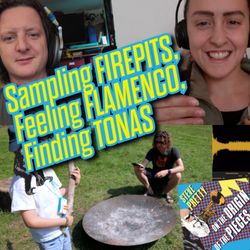
32. RE-UPLOAD: Sampling Firepits, Feeling Flamenco, Finding Tonás
52:43||Ep. 32⚠️ Note: This is a re-uploadThe original episode was taken down due to a copyright strike on the theme tune — even though I wrote and produced it myself. While I sort that out, you’re treated to a gloriously bad placeholder version.Also, I’ve trimmed down the Clip n Mix segment — I was clearly having too much fun with firepits last time, and it got a bit… indulgent. This one gets to the good stuff faster.🔥 Can you make music from a campsite firepit?And what is Tonás — the raw, unaccompanied flamenco style with roots in secrecy, survival, and soul?In this episode, I launch a new segment called Clip n Mix, where I turn everyday sounds into music. This time? A campsite firepit. My son and I hit it with sticks, sample it using Ableton Note, and turn it into a crunchy little beat — which you’ll hear later in the episode.Then we dive into one of flamenco’s most haunting styles: Tonás. My guest is the brilliant Josie Sinnadurai, a flamenco dancer based in Seville, who helps unpack the history, sound, and emotional depth of this unaccompanied vocal tradition.👇 Full chapters and links below!⏱️ Chapters00:00 – Intro + why the theme tune sounds different02:20 – Clip n Mix: sampling a firepit in Dorset09:45 – What is Tonás?10:20 – Interview with Josie Sinnadurai34:50 – Why I didn’t make a Tonás track35:20 – Turning firepit samples into music49:15 – Sound, play, and curiosity54:25 – Live shows + Patreon + sign-off🔗 Links🎬 Watch the Tonás video:https://www.youtube.com/watch?v=X7vpU5zLl-A👣 Follow Josie Sinnadurai:Website: https://www.josielaurelflamenco.com/Instagram: @josie_sinna📱 Try Ableton Note (free app):iOS: https://apps.apple.com/app/ableton-note/id1611814758Android: https://play.google.com/store/apps/details?id=com.ableton.note🎧 Download the firepit samples + Ableton Note session:https://www.patreon.com/StevePrettyOnTheOriginofthePieces🎟️ Live at Wilton’s Music Hall – 24th Jan 2026👨👩👧👦 Kids show (2pm):https://wiltons.org.uk/whats-on/steve-pretty-and-friends-on-the-origin-of-the-pieces-kids/🌙 Evening show (7pm):https://wiltons.org.uk/whats-on/steve-pretty-and-friends-on-the-origin-of-the-pieces-2/💬 Got a weird sound you’d like me to turn into music?Drop it in the comments or email podcast@stevepretty.com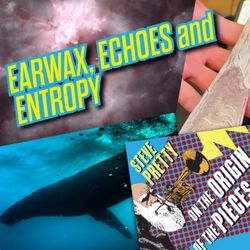
31. Earwax, Echoes and Entropy
57:22||Ep. 31What can a lump of whale earwax tell us about human history?What does the end of the universe sound like?And how do you play the sea like a synthesiser?This episode of Steve Pretty On The Origin of the Pieces goes from marine mammal physiology to cosmological heat death, taking in hydrophones, cultural transmission in humpbacks, the physics of underwater sound, and an improvised trumpet elegy for the end of everything.My guests are:Chris Lintott – astrophysicist, broadcaster, and co‑host of The Sky at Night. We open with a live extract from our Universe of Music show, performed at Gresham College — exploring what sound and music can tell us about the ultimate fate of the cosmos.Richard Sabin – whale expert and lead curator of mammals at the Natural History Museum, who shares sonic insights from the deep — including how 150 years of whale earwax is helping scientists track stress in marine life.We also:Hear vintage 78 rpm whale recordings, played on a £60k system at Audio GoldUse filters to “play the sea” like a scaleDrop a hydrophone into a water tank and see how sound behavesDiscuss echolocation, underwater acoustic pollution, and whale “culture”Recreate underwater acoustic effects via processing and pitch shiftingReflect on what it means to really listen — to whales or the cosmosRecorded live at the brilliant First Light Festival in a sweltering tent by the sea (thanks again to them for hosting us).🧠 Bonus content🎥 The full, uncut interview with Richard Sabin — including audience Q&A and extended hydrophone demos — is available on Patreon.👯 Mentioned in this episodeSonic Collaborations – project by Colin Riley & teamAudio Gold – London hi‑fi / vinyl emporiumNatural History MuseumFirst Light FestivalChris Lintott💌 How to support the showJoin the mailing list: www.originofthepieces.comBecome a patron: patreon.com/StevePrettyOnTheOriginofthePiecesShare with a musically curious friendRate & review on Apple or Spotify — it genuinely helps 🎧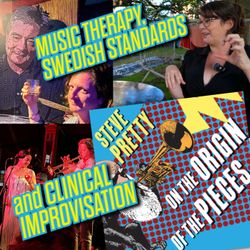
30. Music therapy, Swedish standards and clinical improvisation
45:42||Ep. 30This week I speak to Kassandra e’Silva, a saxophonist, improviser and NHS music therapist. We caught up just before a gig at the Edinburgh Jazz Festival to talk about the power of music in care settings — from dementia wards and mental health clinics to the BBQ playlist at home.We cover:Baby‑wearing during soundcheck 👶Pre‑verbal communication in musicClinical improvisation and jazzWhether all music is a kind of therapyAnd why rhythm might be the most important bit—⏱️ Highlights00:00 – Intro – ALSO Festival, Nosferatu live score, and a conch bath update03:00 – Edinburgh Jazz Festival – A tribute to The Jazz Bar and Bill Kyle08:30 – Interview with Kassandra e’Silva – Backstage at the Spiegeltent10:00 – What music therapy is – Presence, trauma, and non-verbal expression13:30 – Lighting up the brain – Music as reconnection16:00 – Music at both ends of life – Parenting and dementia20:00 – Letting go of ‘good’ music – From jazz standards to egg shakers23:10 – Rhythm as anchor – Repetition, stability, and mental health25:40 – Creative expression – Instruments, blocks, and tambo-responsiveness29:40 – Teaching vs therapy – When learning becomes part of healing31:40 – Improvisation as diagnostic mirror – Sound as resistance34:40 – Participation matters – Why passive listening isn’t enough36:10 – What’s the point of music? – A beautiful closing answer—🎶 Check out Resounding, co-written with Nicole Cassandra Smit, on Hackney Colliery Band – Collaborations: Volume Two👉 Listen on Bandcamp—💬 Resource: Music in Dementia (NHS Lothian)Kassandra helped develop this practical guide for carers, families and practitioners.Includes activity ideas, playlists, and real examples from NHS care.🎵 Explore the guideNote: Kassandra’s views are her own, not those of NHS Lothian.—🎧 Support the show:💌 originofthepieces.com☕ patreon.com/StevePrettyOnTheOriginofthePieces#musictherapy #jazz #musicanddementia #improvisation #originofthepieces #kassandraesilva #stevepretty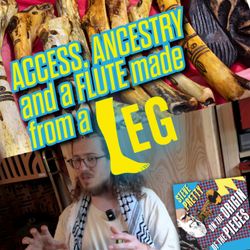
29. Access, ancestry and a flute made from a leg
43:58||Ep. 29This week, Steve shares a powerful, surprising, and often jaw-dropping conversation with musician, composer and activist Jono Enser.Jono is a gifted multi-instrumentalist and a member of Nubiyan Twist, but he’s also a disabled artist whose recent experiences as an amputee have sparked a radical rethinking of performance, access, and the body as instrument — quite literally. Together, they explore:The challenges and realities of touring as a disabled musicianHow venue design (or lack of it) creates systemic barriers to inclusionThe radical creativity of reclaiming trauma — including Jono’s current project turning his amputated leg bone into a working fluteMusical ancestors: from Neanderthal bone flutes to Tibetan thighbone trumpetsWhy accessibility isn’t just a bolt-on feature — it’s a cultural responsibilityAnd what it means to give your pain a voice, breath, and songPlus, Steve shares a clip from his Ocean Songs sunrise performance at Benacre Broad — part of his work with the Blue Machine project, inspired by Dr. Helen Czerski’s oceanography book of the same name.There’s a lot packed in here, and it’s one of the most wide-ranging and deeply personal episodes yet.🎟 Jono’s band Nubiyan Twist are touring this summer – check them out.🎶 His solo project Matters Unknown is also worth diving into.🎤 Steve is performing live at ALSO Festival and on July 11th at the National Maritime Museum with Blue Machine – see originofthepieces.com for details.—🧡 Support the podcast and get exclusive content at:patreon.com/StevePrettyOnTheOriginofthePieces🎧 Listen, watch, share and review: it all helps the podcast grow.📍 More info at originofthepieces.com00:00 – Welcome back + Acid Brass recapSteve introduces the episode and reflects on his recent chat with Jeremy Deller.02:00 – Meet Jono EnserJono’s musical upbringing, his shift from trumpet to tuba, and the spiritual resonance of breath.07:00 – Life as a touring amputeeThe hidden and not-so-hidden barriers for disabled musicians on the road.10:00 – Access is everywhere (or isn’t)From venue layouts to door weights and bar heights — access means more than ramps.14:00 – What artists and venues can actually doPractical steps, responsibility, and why checking access before the gig matters.18:00 – Ocean Songs interludeSteve shares a clip from his beachside dawn performance as part of the Blue Machine project.23:00 – A flute made from his own amputated legJono’s extraordinary project connecting trauma, ancestry, and sonic experimentation.28:00 – Resonance, ritual, and reclaiming spaceCaves, Ambisonics, somatic practice and ecological listening.32:00 – Music as breath and transformationWhy giving pain a voice — literally — matters.36:00 – What’s the point of music?Jono’s heartfelt answer to Steve’s recurring question.40:00 – Wrap-up and upcoming gigsTour dates, ALSO Festival, and National Maritime Museum performance previews.
28. Jeremy Deller, 303s and knitting
38:10||Ep. 28❤️ Support the show on Patreon: http://www.patreon.com/StevePrettyOnTheOriginofthePieces📬 Join the mailing list + explore the archive: https://www.originofthepieces.comWelcome back to your favourite podcast for musically curious ears! This week, I’m talking to the brilliant Jeremy Deller, Turner Prize-winning artist and creator of the now-legendary Acid Brass project — a bold collision of working-class brass band tradition and squelchy late-80s acid house.Join us as we trace the unexpected cultural connections between miners’ strikes, 303s, and knitting in the front row…⏱️ Chapters and Highlights:00:00 – Welcome and new format introSteve explains the new single-topic format and introduces today’s guest, Jeremy Deller.02:00 – The story of Acid BrassFrom a Turner Prize idea to a 30-year legacy: how Jeremy connected acid house and brass bands.05:00 – Why it inspired Hackney Colliery BandSteve reflects on how Acid Brass shaped his own journey.07:00 – Interview Pt. 1: Backstage at rehearsalJeremy and Steve discuss working-class music, the politics of sound, and whether acid house is “folk.”14:00 – What’s a 303, anyway?Steve demos the iconic Roland TB-303 and compares it to traditional brass.17:00 – Interview Pt. 2: Deeper diveJeremy reflects on his artistic intentions, early audience reactions, and the cultural fallout.29:00 – The knitting incidentYes, really. Knitting, brass bands and acid house. Who'd have thought?32:00 – Musical roles and expectationsSteve discusses how Acid Brass plays with what music is for.33:00 – The Big Question: What’s the point of music?Jeremy shares his thoughts on connection, spirit, and why most artists are just frustrated musicians.36:00 – Outro and rehearsal teaserSteve wraps up and previews an exclusive clip from the Acid Brass rehearsal at EartH Hackney.🎟️ Event Promo (if catching in time!)Catch Acid Brass live at EartH Hackney on 13th June 2025, followed by a late-night party with acid house pioneer A Guy Called Gerald. Limited tickets available!🎟️ Check ticket availability🎥 Video extras & behind-the-scenes at: Patreon.com/StevePrettyOnTheOriginofthePieces